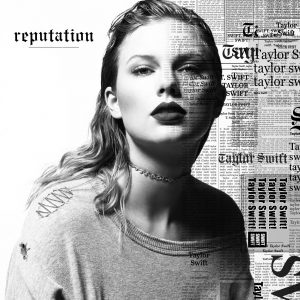Swift’s new album, “Reputation,” doesn’t ‘belong with me’
November 14, 2017
Swift’s sixth album “Reputation” doesn’t meet expectations. The album isn’t nearly as interest- ing or impressive as Swift’s previous albums, “1989” or “Speak Now.” The songs on “Reputation” poorly redefine Swift’s artistry by crafting her music with overproduction and uninspired lyrics. Throughout the album, Swift’s music sounds defensive, mechanic and emphasizes the beats over her voice.
The album does, however, diversify Swift’s catalogue, with each song providing new perspectives and attitudes towards Swift’s personal and romantic narrative.
“Gorgeous,” “Don’t Blame Me” and “I Did Something Bad” are catchy songs that avoid sounding annoying, but “Gorgeous” required repeated listens to fully digest and appreciate.
Upon listening to the album, “Don’t Blame Me” sounds like it has the most potential to be a successful single. Swift sells the track in the final chorus, when she layers her voice to create a captivating and head-bobbing sound. Although the chorus is repeated too many times throughout the song, it’s still enjoyable to listen to, which can’t be said about many of its neighboring tracks.
Throughout “Reputation,” Swift experiments with various 2017 music trends, which include dubstep and trap sounds. For non-electronic fans, songs like “Delicate” and “Call It What You Want” are instant turn-offs.
On “Delicate,” Swift uses a vocoder on the chorus, creating a synthetic sound that overshadows her real voice and ultimately takes away from the song. Music produced in this way is headache-inducing upon first listen. This robotic vocal production spans many of the tracks on the album, with Swift consistently dressing her voice up in electronic noises that take away from her potential as a human vocalist.
Swift’s “Call It What You Want,” isn’t a bad song at its core, but with its trap-lite production, listeners may struggle to maintain focus. On the song, Swift talks about her relationship with a lover — how he loves her and she loves him back because they’re equals. The song’s unoriginal lyrics and basic chord progression ultimately cause it to fade into background noise.
“Reputation” as a whole doesn’t live up to the hype. Its mechanic production takes away from the album’s potential and by introducing this style into her music, Swift’s new songs simply fade into the background.
I personally wouldn’t recommend wasting money on the album, but it ultimately depends on personal taste. While I can’t appreciate Swift’s new music, listeners who enjoy electronic music might enjoy this album.
“Reputation:” ★★
















